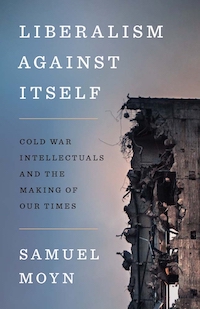Public ideas
How the liberal postwar order became the neoliberal order
In the “postwar” years after 1945 the economic order in western countries was characterized by an economically liberal order – progressive taxation, distributive welfare programs, and active government investment in education and infrastructure, generally along social-democratic lines. In the USA the Republican Eisenhower administration, elected in 1952, maintained the main aspects of the New Deal; in Australia Menzies, leader of the newly-formed Liberal Party (a name deliberately chosen) when elected in 1949 largely continued with the former Labor government’s nation-building programs.

A generation later, in 1979, the election of Thatcher in the UK and the election of Ronald Reagan in the US a year later ushered in the neoliberal order, with its emphasis on small government and the primacy of unregulated markets.
On the ABC’s Religion and Ethics Report Andrew West’s guest, Yale University historian and philosopher Samuel Moyn, explains how the transition from liberalism to neoliberalism was influenced by prominent intellectuals he calls “Cold war liberals”: The mixed legacy of Cold War liberalism. (33 minutes) He includes Friedrich Hayek, Isaiah Berlin, Gertrude Himmelfarb, Karl Popper and Hannah Arendt as some of the most prominent people in this loosely-connected movement.
These intellectuals, most of whom had fled from Nazism, were intensely opposed to totalitarianism in all its manifestations, particularly as it was manifest in the Soviet Union. In their opposition they identified two characteristics that defined Soviet communism – atheism and its justification based on philosophies of the Enlightenment.
Moyn believes that this characterization of Soviet communism resulted in these intellectuals rejecting the ideas of the Enlightenment. They turned to a social philosophy akin to Augustinian Christianity, a creed that rejects the idea of earthly utopias and holds that any high-minded attempt to improve the human condition will fail. That is in contrast to the more liberal Christianity of Rerum Novarum (Pope Leo XIII’s encyclical stressing the rights of workers to share the benefits of economic activity) that shaped the ideas of social-democratic political movements, such as our Labor Party. These philosophers rejected socialism and expansive government because of the association of these ideas with Soviet communism.
It’s a challenging idea, that a small group of Jewish intellectuals can help shape a whole western world economic order based on a primitive manifestation of Christianity. Indeed it’s hard to believe that either Thatcher or Reagan had the intellectual capacity to reflect on the ideas guiding their ways of working. But public ideas can circulate in a political milieu as a collective consciousness. We should never underestimate the power of public ideas, even when they are deeply flawed.
Moyn is author of Liberalism against itself: cold war intellectuals and the making of our times.
Going cashless
A most annoying business practice is for merchants, from airlines through to fruit stalls, to charge a fee for use of credit cards or debit cards – often, as is the case for airlines, if there is no cash option.
Businesses may feel justified in applying these surcharges because they see them as simply passing on fees charged by financial institutions. But no transaction is costless, and handling cash has its own costs – reconciling cash registers, the security risk of holding cash, the need to deposit cash with banks. Perhaps, if businesses seriously analysed these costs, they would reasonably apply a surcharge for use of cash, or a discount for electronic forms of payment.
These are some of the issues addressed in a talk Modernising Australia’s payments System by RBA Governor Michele Bullock. The talk is about the payments system in general, including the phase-down of an early electronic system known as the Bulk Electronic Clearing System and its replacement with a more fit-for-purpose system – a change that will be largely unnoticed by people receiving regular salary and other payments.
It’s also about the cost of cash, including the maintenance of networks of ATMs (governed by an access regime) and the physical distribution of cash, which has become unprofitable as the volume and value of cash transactions has fallen away. The share of consumer payments using cash has steadily declined from 70 percent in 2007 to 13 percent in 2022.

How do we think about this stuff?
Those figures are about cash as a means to finance transactions, and if the trend were to continue without flattening out we would be looking forward to a situation by 2025 when the only users of cash would be spivs evading detection by the authorities.
Bullock reminds us that cash is also used as a precautionary store of wealth – to tide us over during outages during natural disasters, or when our fragile privatized telecoms fail.
These are the practical issues addressed in Bullock’s speech, and covered in some of the media reports. There are also many issues to do with privacy and the very nature of money which are not mentioned.
The elimination of cash would be beneficial to the community on many counts. It would make life hard for drug dealers and small businesses that pay employees in cash without documentation or deductions for tax and superannuation. No longer would tax-evading small businesses be able to offer discounts for cash payments. (Hint, whenever you pay a merchant by cash always ask for a proper GST receipt.) Cashless businesses and individuals would become less attractive targets for thieves. (In this regard it’s strange that older people, least able to defend themselves, are among those most attached to cash.)
Those are sound utilitarian considerations for getting rid of cash, but a cashless society is also one without the anonymity of cash. Perhaps we are already past that point anyway – if we fly, use public transport or drive on toll roads, our travels are traceable. Financial institutions can analyse our spending patterns and internet use, using the data to develop profiles for targeting advertisements.
It’s not hard, however, to imagine how an authoritarian state may operate in a cashless society. Donations to designated political parties or causes may be blocked, as may subscriptions to subversive publications. People deemed to be enemies of the state may find that they are unable to book overseas travel.
These scenarios are not entirely hypothetical: we should remember that in 1951 a Coalition government tried to have a political party banned: a block on donations and subscriptions would have been much easier than a referendum. Much more recently, in 2016, a Coalition government introduced the cashless welfare card, which allowed for a strong form of social control. Cash as a payment option provides some protection against such authoritarian moves.
More basically we should consider how our understanding of money might be changing as we come to live in a cashless society. Does the balance on our banking app have the same meaning as the balance on a printed bank statement, or as a pile of banknotes and coins? The conventional wisdom is that as money becomes less tangible we become less careful in our spending. But conversely, perhaps, the ephemeral nature of those on-screen displays will help us realize that money is simply an accounting convenience, rather than something with any intrinsic value, and will encourage us to think of wealth in all its dimensions.
Levies and taxes
Farmers, like other small businesspeople, aren’t particularly enthusiastic about paying taxes. But they have been quite accepting of levies on agricultural production to finance collective benefits – levies for promotion of products, levies for biosecurity, levies for research, and so on.
Until late last century the use of levies was largely confined to rural industries, but since then their use has expanded to other industries, and state governments have come to use levies to collect revenue for specific purposes, such as environmental protection and disposal of waste.
The growth and incidence of levies is analysed in a Productivity Commission research paper Towards levyathan? Industry levies in Australia, which traces a tenfold increase in the number of levies since 1980.
Some levies, such as the original agricultural levies, are specifically linked to provision of shared services for particular industries: as such they are more akin to user charges than to taxes. Some, such as environmental levies, are collected to pay for negative externalities. Some, such as Victoria’s tax on Airbnb and other short-term rental, are hypothecated to particular public services, but without any benefit to those who pay the levy. And some simply seem to be means of supplementing general revenue, but without the name “taxation”. Then there is what is called the “Medicare Levy”, but it’s not included in the Commission’s list, because it is really just a tax supplement, with no specific hypothecation to Medicare.
The authors describe levies as “the long tail of Australia’s tax system”, a description justified by the observation that while 10 taxes collect more than 90 percent of tax revenue, our 256 levies collect only 2 percent of revenue. They note that their collection costs, generally in the area of 1.0 percent of revenue collected, are higher than the ATO’s collection cost of about 0.6 percent. (They may have added that they are still much lower than the collection costs of some privatized “taxes”, such as private health insurance, which are as high as 13 percent.)
Unsurprisingly, the authors would like to see some levies rolled into general taxation, which is cheaper to collect and does not incorporate some of the allocative distortions of levies. But they also acknowledge that levies are more acceptable to the public than general taxes because they are seen to be linked to provision of public services, and can provide a way around the arbitrary benchmark of capping Commonwealth taxes to 23.9 percent of GDP.
This is a long-standing issue in public finance. If people are asked “would you like to pay more taxes?” the answer is a resounding “no”, but if they are asked if they should pay more tax for specific services, particularly health care and education, and sometimes transport and policing, they become much more accepting of tax increases.
If governments with a social-democratic leaning could establish in the public mind a stronger link between taxes and services that people want, they would find it easier to raise taxes. Conversely governments on the right find the separation of taxes and benefits to be convenient, because in playing into people’s resistance to taxation, that separation sustains conservatives’ “small government” agenda. Conservatives’ rhetoric is about “choice”, but they are determined to deny citizens the choice of paying more for better schools, hospitals, roads, public transport and policing.